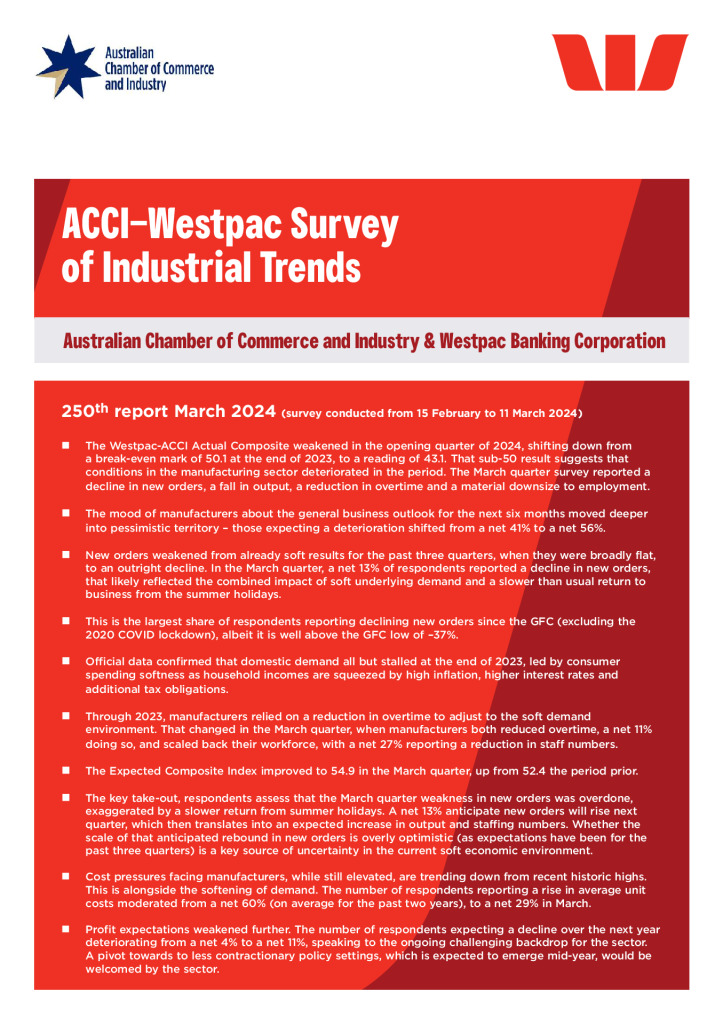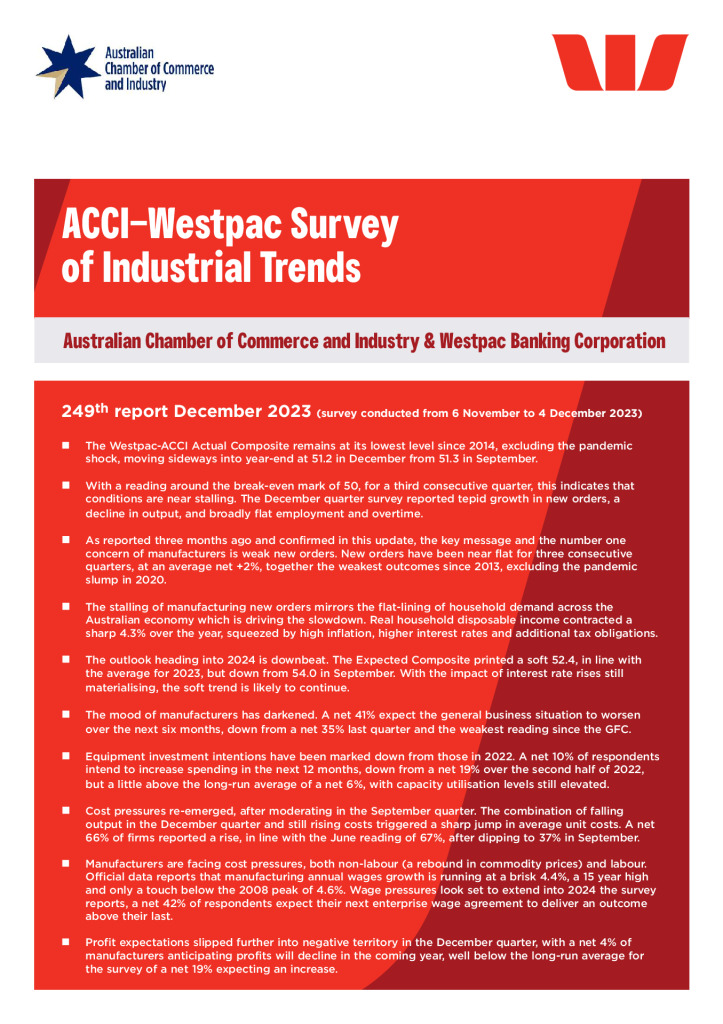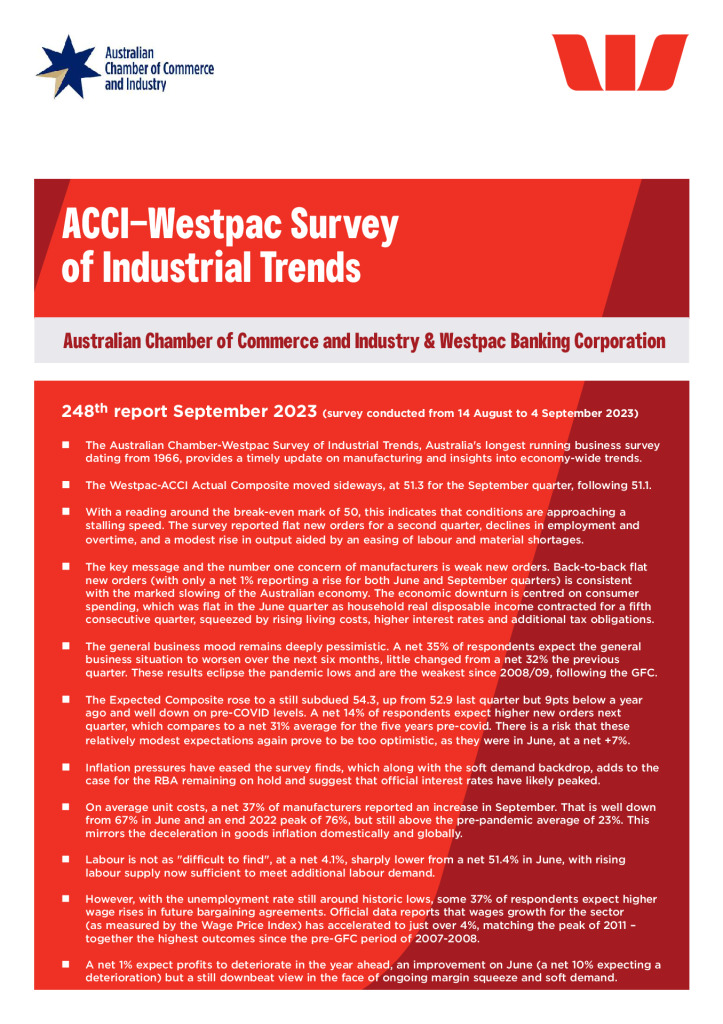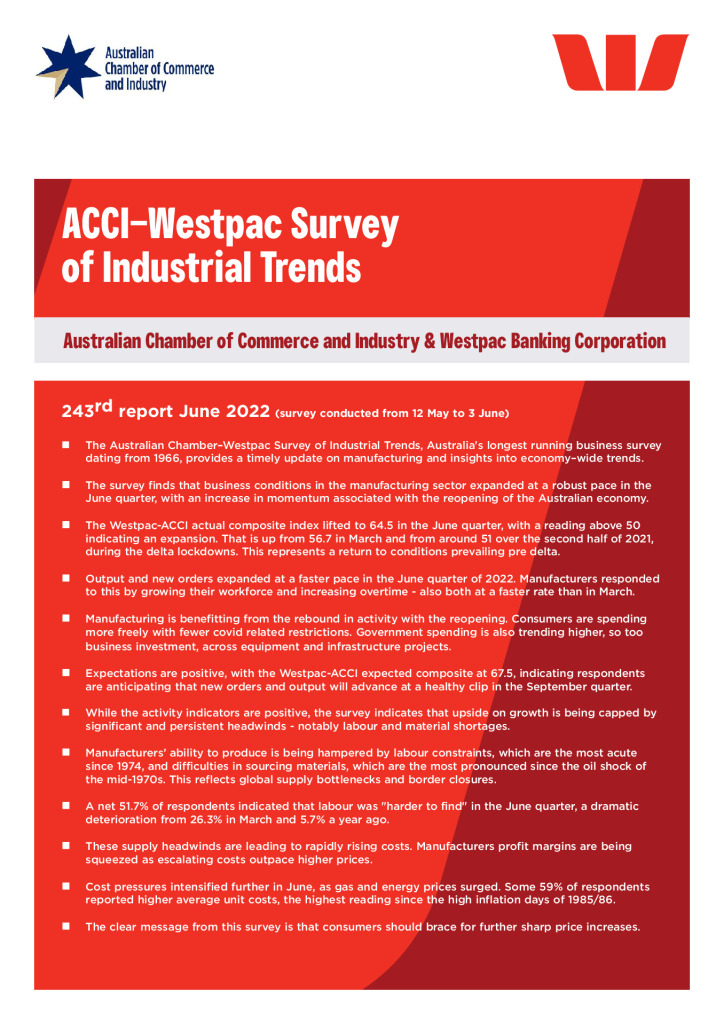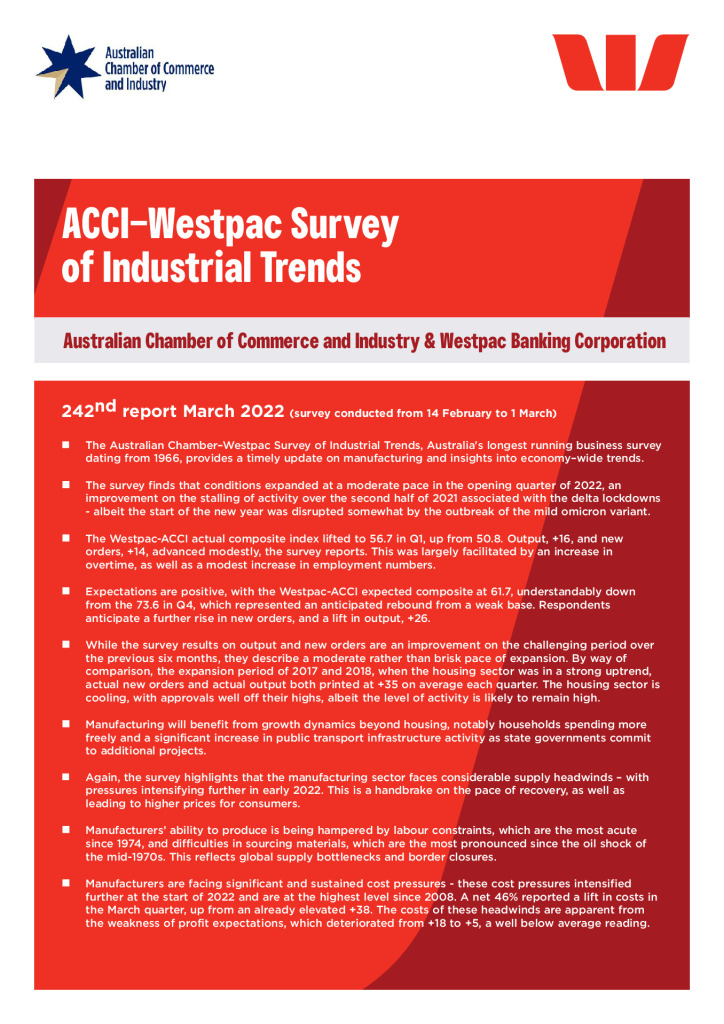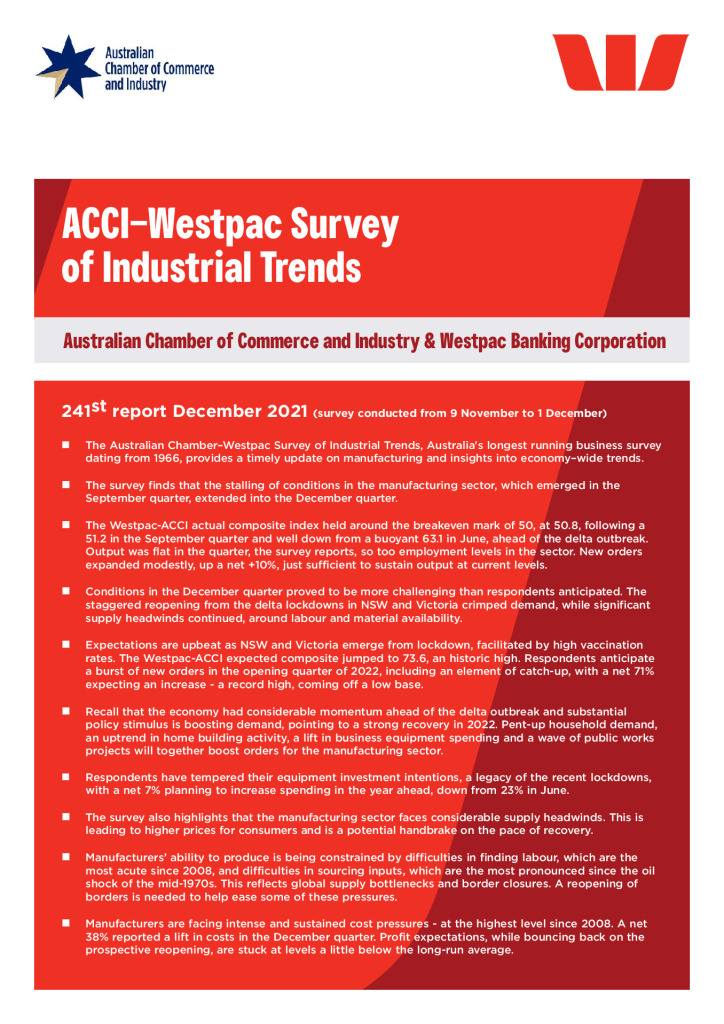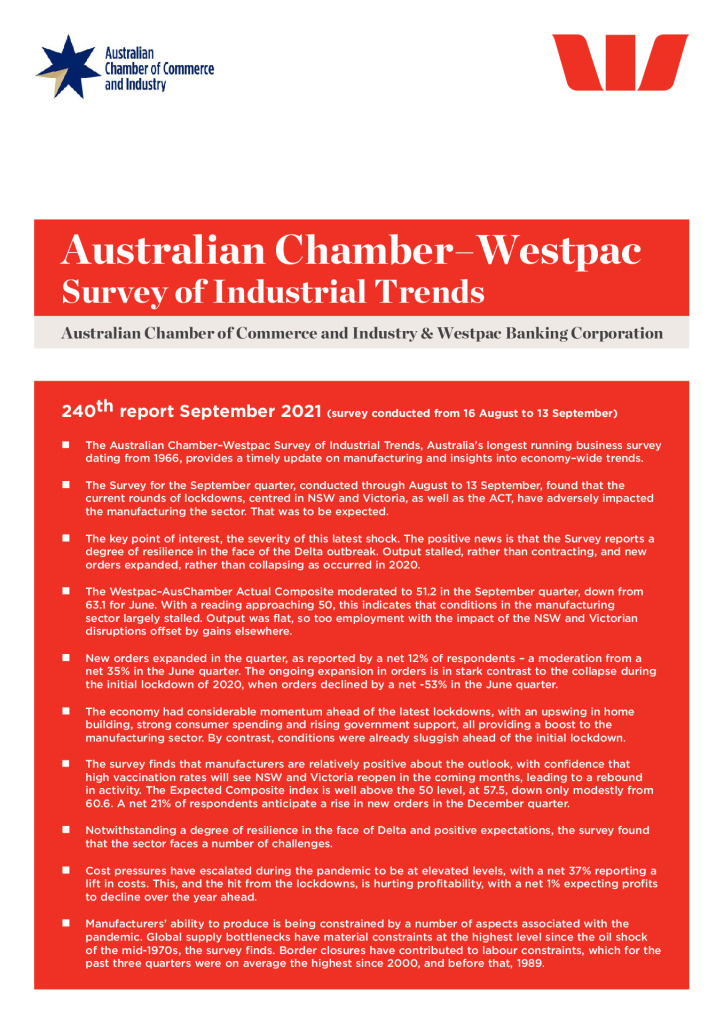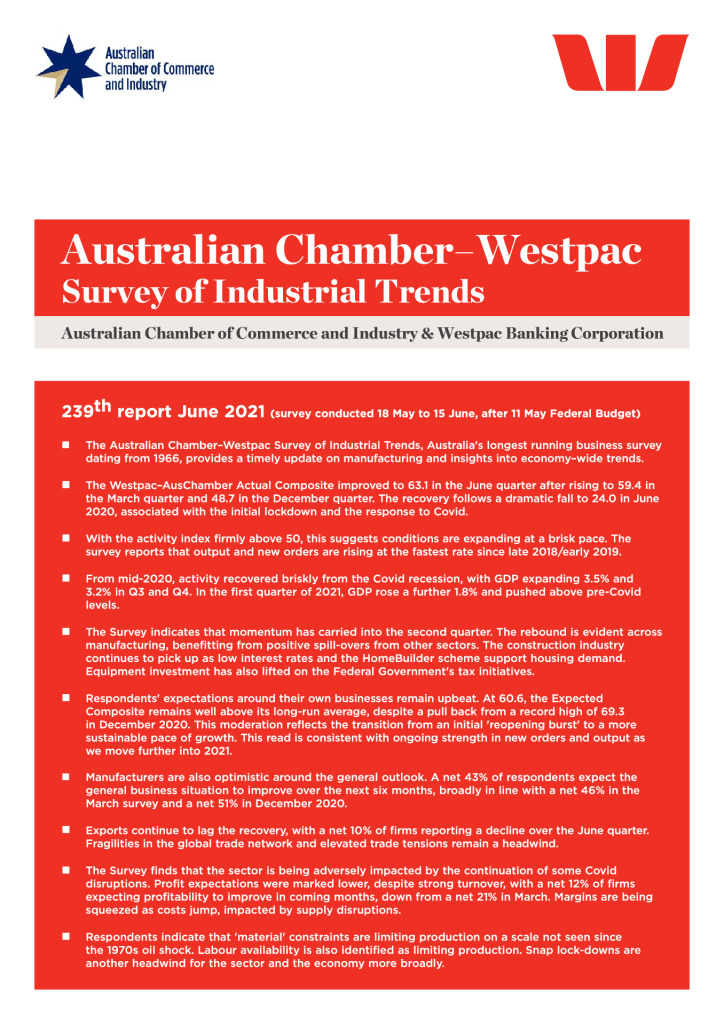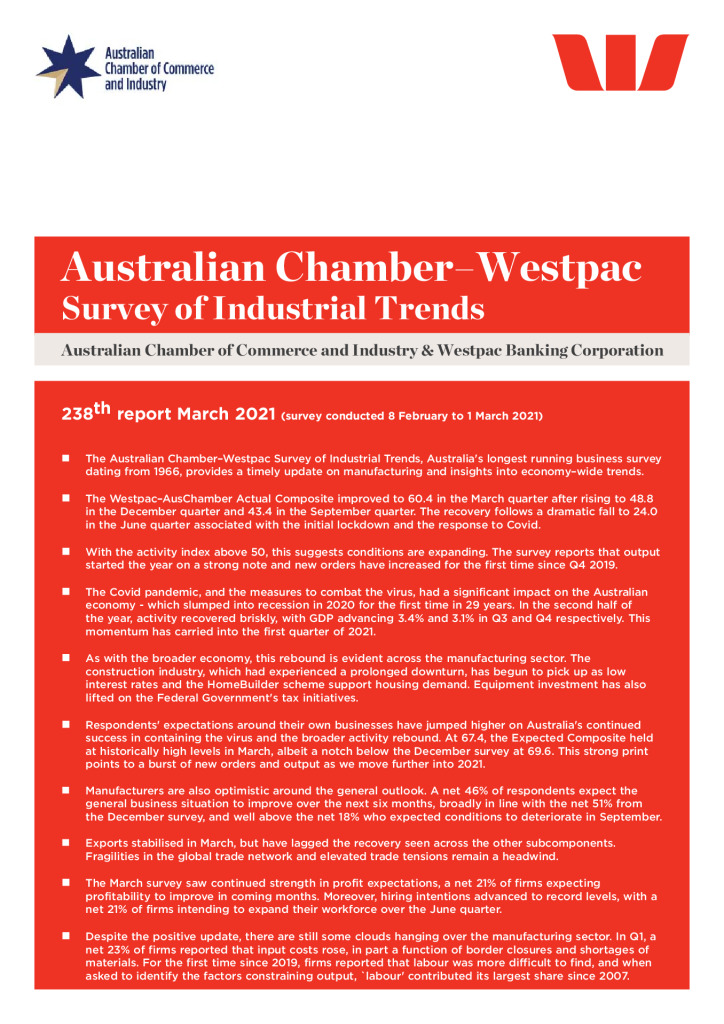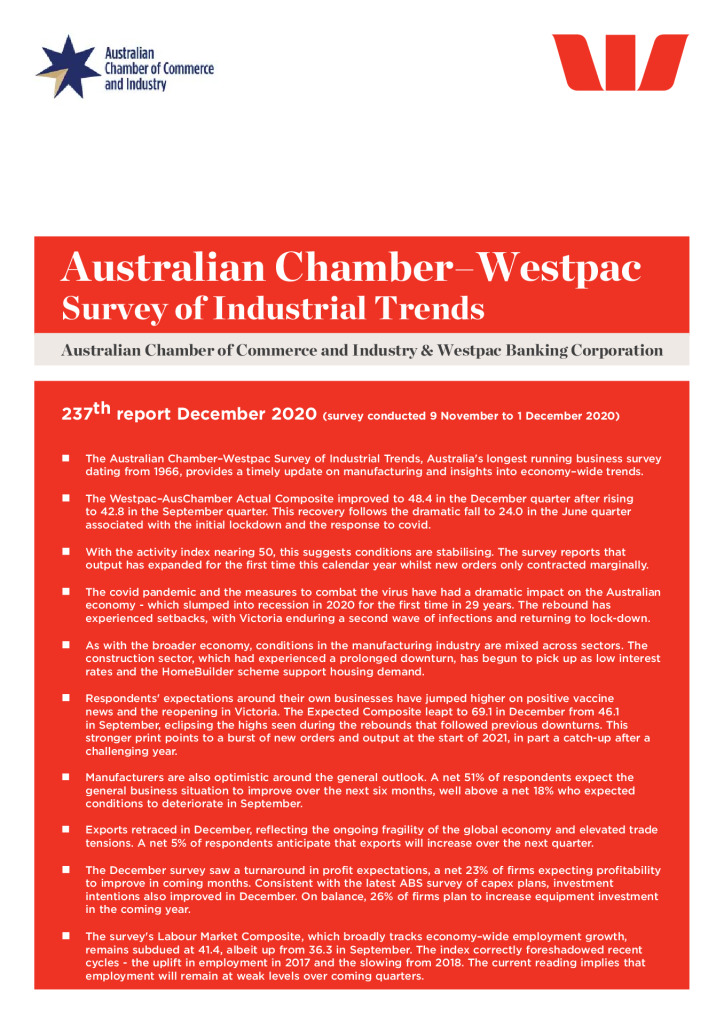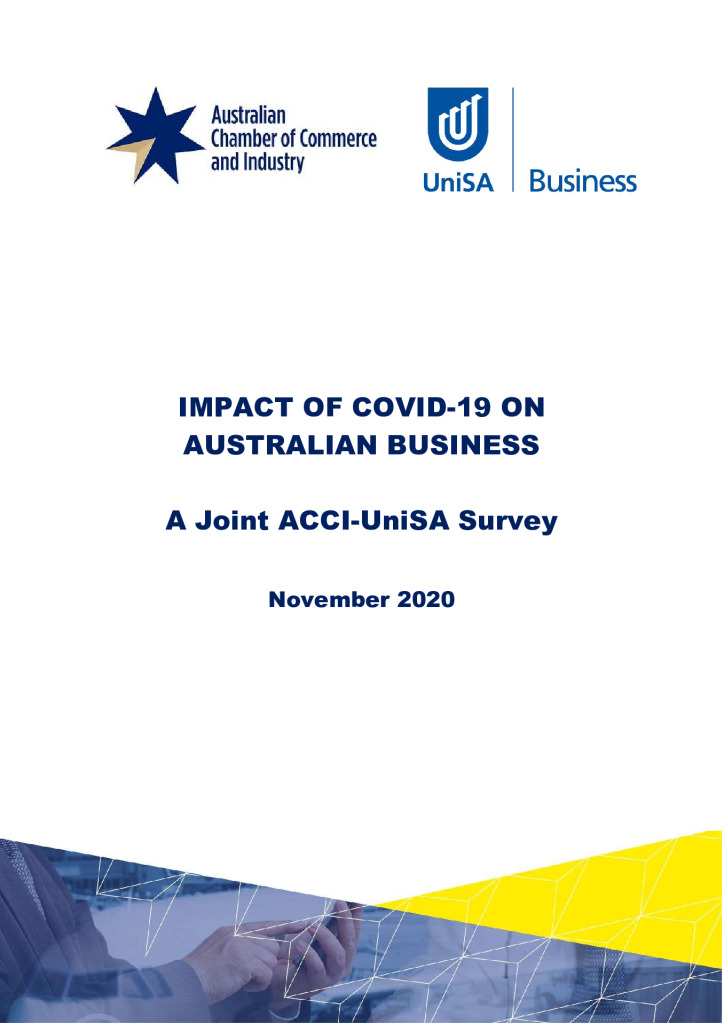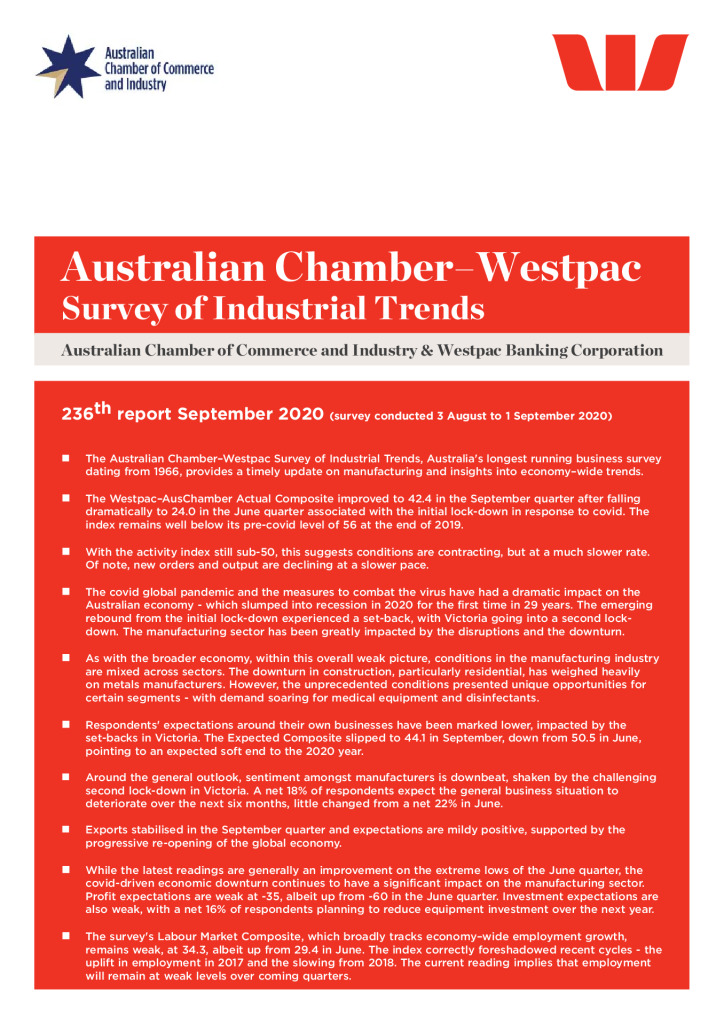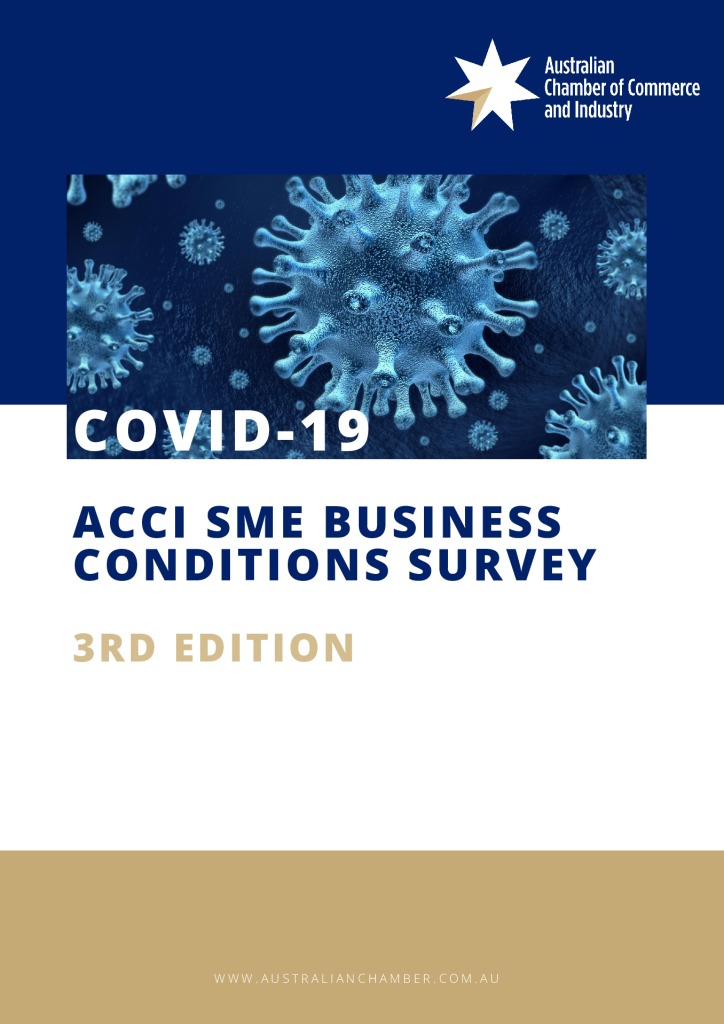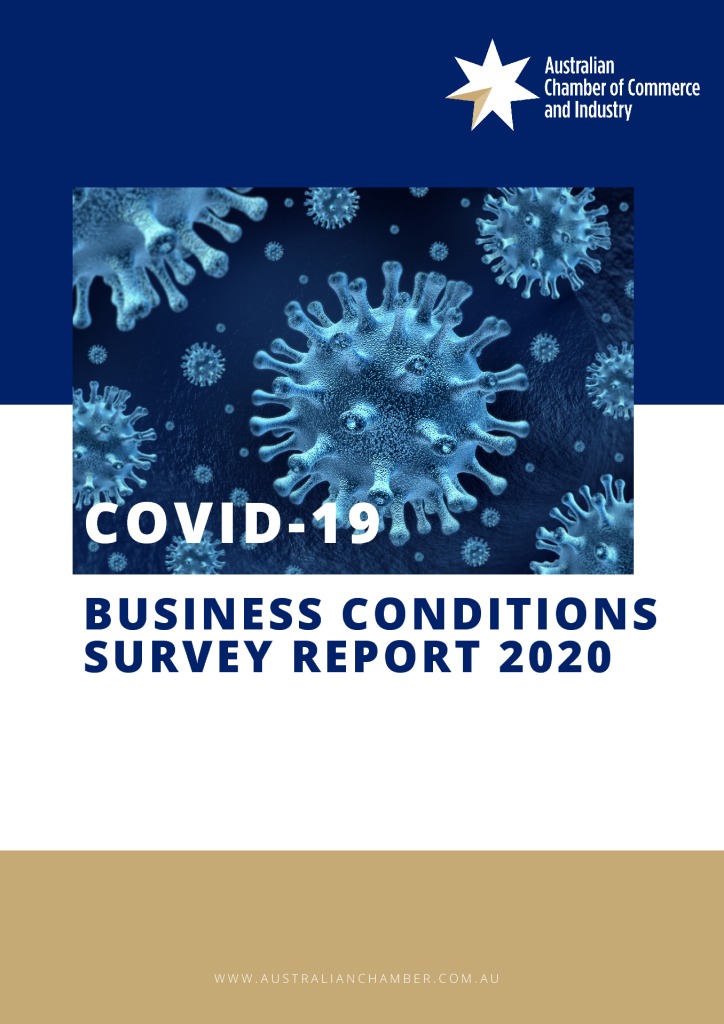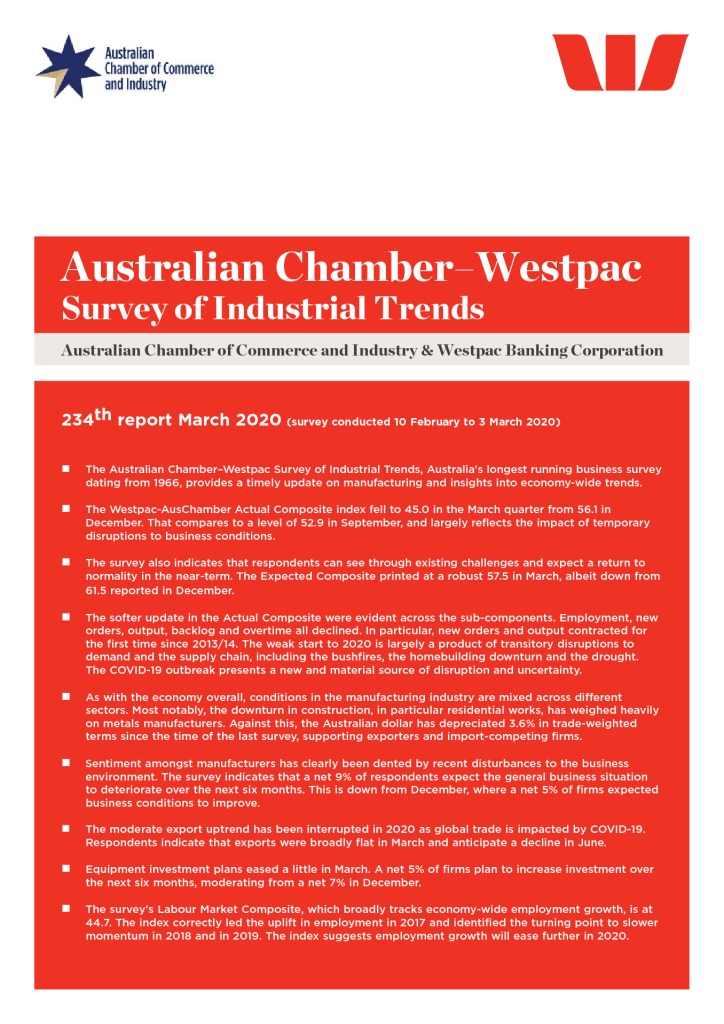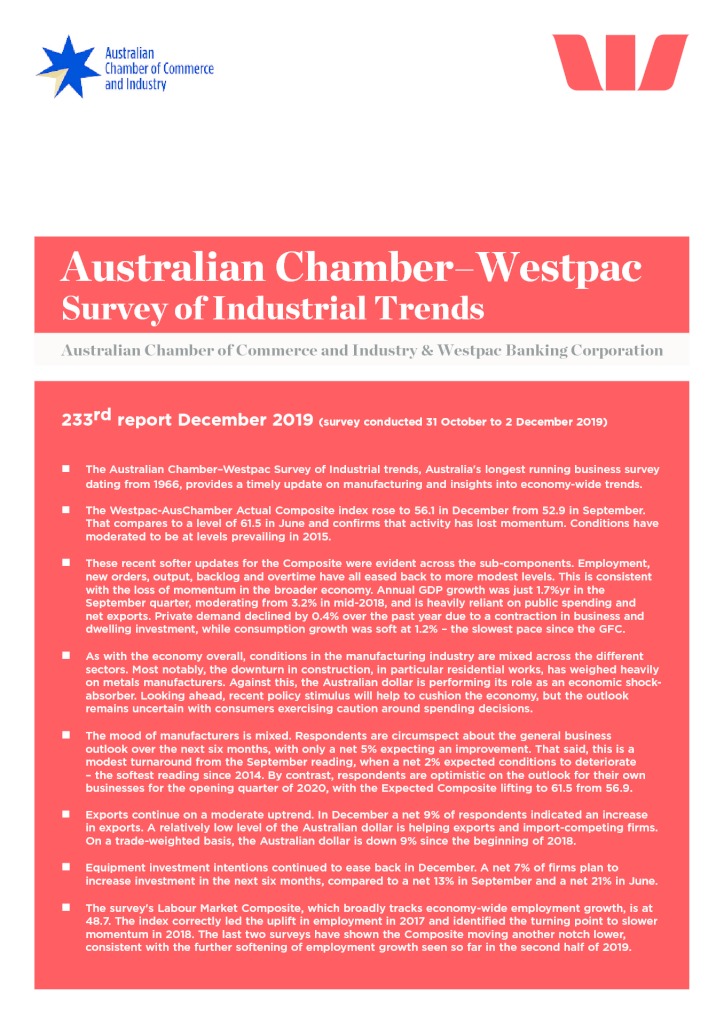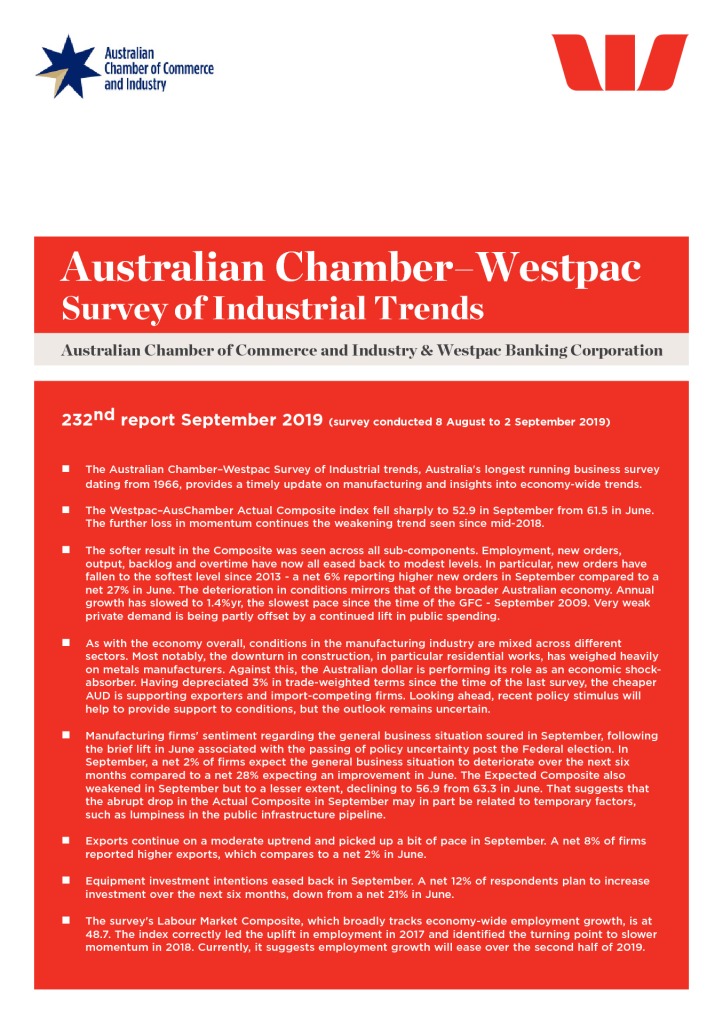Member Login
Economic Surveys
We conduct quarterly economic surveys to check the pulse of Australian businesses and inform our policy positions. They are often cited in the media and considered by the Reserve Bank of Australia.
ACCI-Westpac Survey of Industrial Trends
The Westpac-ACCI Actual Composite weakened in the opening quarter of 2024, shifting down from
a break-even mark of 50.1 at the end of 2023, to a reading of 43.1. That sub-50 result suggests that
conditions in the manufacturing sector deteriorated in the period. The March quarter survey reported a
decline in new orders, a fall in output, a reduction in overtime and a material downsize to employment.
ACCI-Westpac Survey of Industrial Trends
Australia’s manufacturing sector is feeling the impact of the slowing economy following an extended period of high inflation and rising interest rates, according to the latest ACCI-Westpac Survey of Industrial Trends for Q4 2023.
ACCI chief of policy and advocacy David Alexander said the December quarter survey demonstrated that businesses across the country are feeling the impact of a slowing economy, high inflation, and rising interest rates.
“Profit expectations remain in negative territory for the third consecutive quarter as margins continue to be squeezed by rising input and wage costs, leaving businesses limited opportunity to pass these on through higher prices. ”
ACCI-Westpac Survey of Industrial Trends
Australian manufacturing is facing challenges on multiple fronts, the latest ACCI-Westpac Industrial Trends Survey has found.
“Manufacturers are starting to feel the strain of slowing orders and it is reflected in their hiring and investment intentions. Australia’s broader economic slowdown has begun to affect the manufacturing sector,” ACCI chief executive officer Andrew McKellar said.
“Labour shortages that gripped the sector are no longer the central concern. Rather, it was a lack of new orders over the last six months that limited production.”
ACCI–Westpac Survey of Industrial Trends | June 2022
The Australian Chamber–Westpac Survey of Industrial Trends, Australia’s longest running business survey dating from 1966, provides a timely update on manufacturing and insights into economy–wide trends.
ACCI–Westpac Survey of Industrial Trends | March 2022
The Australian Chamber–Westpac Survey of Industrial Trends, Australia’s longest running business survey dating from 1966, provides a timely update on manufacturing and insights into economy–wide trends. The survey finds that conditions expanded at a moderate pace in the opening quarter of 2022, an improvement on the stalling of activity over the second half of 2021 associated with the delta lockdowns – albeit the start of the new year was disrupted somewhat by the outbreak of the mild omicron variant.
ACCI – Westpac Survey of Industrial Trends | December 2021
The Australian Chamber–Westpac Survey of Industrial Trends, Australia’s longest running business survey dating from 1966, provides a timely update on manufacturing and insights into economy–wide trends. The survey finds that the stalling of conditions in the manufacturing sector, which emerged in the September quarter, extended into the December quarter.
Download
ACCIWestpac2021Q4
PDF 245.67 KB
Australian Chamber – Westpac Survey of Industrial Trends | September 2021
The Australian Chamber–Westpac Survey of Industrial Trends, Australia’s longest running business survey dating from 1966, provides a timely update on manufacturing and insights into economy–wide trends. The Survey for the September quarter, conducted through August to 13 September, found that the current rounds of lockdowns, centred in NSW and Victoria, as well as the ACT, have adversely impacted the manufacturing the sector. That was to be expected.
Australian Chamber – Westpac Survey of Industrial Trends | June 2021
The Westpac-AusChamber Actual Composite improved to 63.1 in the June quarter after rising to 59.4 in the March quarter and 48.7 in the December quarter. The recovery follows a dramatic fall to 24.0 in June 2020, associated with the initial lockdown and the response to Covid.
The Impact of Payroll Tax on Business – 2021 Survey
Australian Chamber–Westpac Survey of Industrial Trends | March 2021
The Westpac–AusChamber Actual Composite improved to 60.4 in the March quarter after rising to 48.8 in the December quarter and 43.4 in the September quarter. The recovery follows a dramatic fall to 24.0 in the June quarter associated with the initial lockdown and the response to Covid.
Download
AusChamberWestpac2021Q1
PDF 173.5 KB
Australian Chamber–Westpac Survey of Industrial Trends | December 2020
The Westpac–AusChamber Actual Composite improved to 48.4 in the December quarter after rising to 42.8 in the September quarter. This recovery follows the dramatic fall to 24.0 in the June quarter associated with the initial lockdown and the response to covid.
Impact of COVID-19 on Australian Business | A joint ACCI-UniSA Survey
A new joint survey produced by ACCI and the University of South Australia has found that maintaining supply chains continues to be one of the most challenging issues for Australian businesses to overcome during the pandemic. COVID Normal will become the new normal for Australian businesses. The impact of the pandemic has changed the way we trade, operate and communicate. The survey also shows the necessity for governments and the private sector to begin the process of de-risking our economy from further outbreaks or similarly crippling events.
Australian Chamber–Westpac Survey of Industrial Trends | September 2020
The Westpac–AusChamber Actual Composite improved to 42.4 in the September quarter after falling dramatically to 24.0 in the June quarter associated with the initial lock-down in response to covid. The index remains well below its pre-covid level of 56 at the end of 2019.
Covid-19 Business Conditions Survey Report- 3rd Edition
This survey examines the impact of social distancing and travel restrictions on businesses, and the pace in the easing these restrictions. It also seeks business’ views on which Government support measures are of greatest benefit and how prepared they are for the winding back of this support.
Australian Chamber–Westpac Survey of Industrial Trends | June 2020
The Westpac–AusChamber Actual Composite index fell to 24.0 in the June quarter, to be around the historic low for the series, indicating a sharp contraction in activity in the period. That is down from 45.0 in March and compares to 52.9 in December 2019.
Download
AusChamberWestpac2020Q2
PDF 644.1 KB
Covid-19 Business Conditions Survey Report- 2nd Edition
The results of the second ACCI survey are now available. We surveyed a broad cross-section of our membership to examine the benefit of JobKeeper, the effect of social distancing and the changes made to business operations to meet social distancing requirements.
Covid-19 Business Conditions Survey Report
The survey was undertaken between 30 March and 17 April and involved 1,497 businesses across all states and territories. We would like to acknowledge the assistance of our states and territories chamber associates and industry association members for their assistance in developing and distributing the survey through their membership networks.
Australian Chamber–Westpac Survey of Industrial Trends | March 2020
Australian Chamber–Westpac Survey of Industrial Trends | December 2019
Australian Chamber–Westpac Survey of Industrial Trends | September 2019
Download
AusChamberWestpac2019Q3
PDF 468.2 KB

